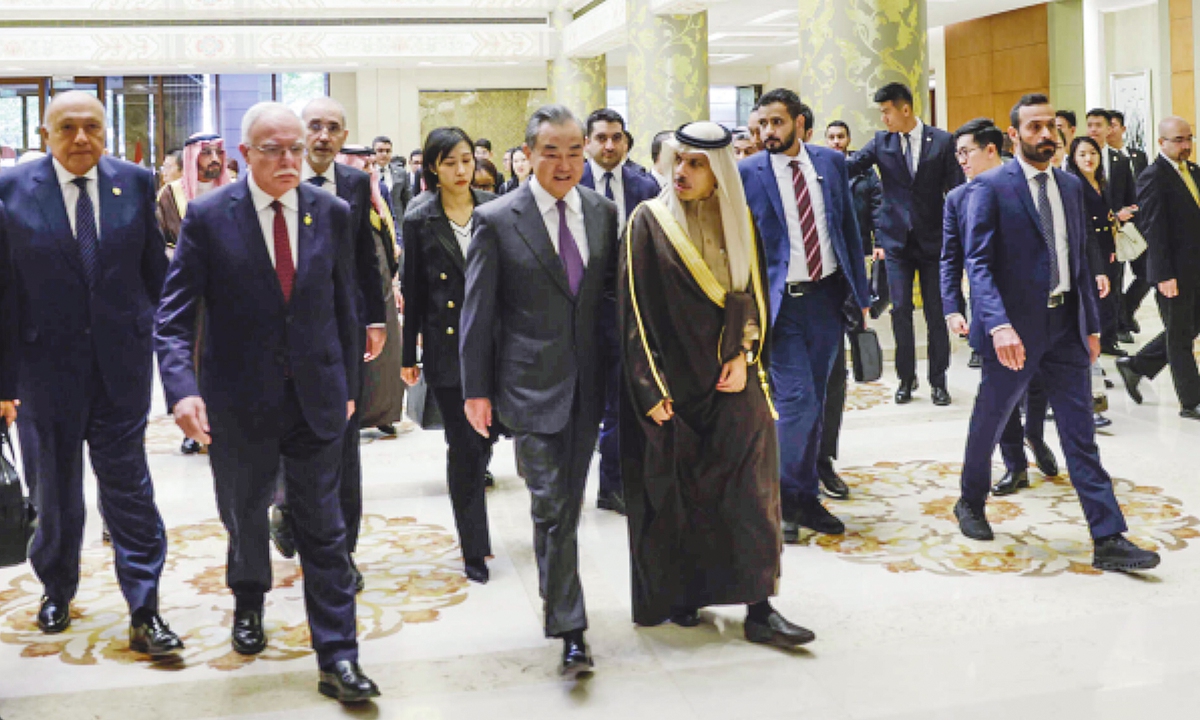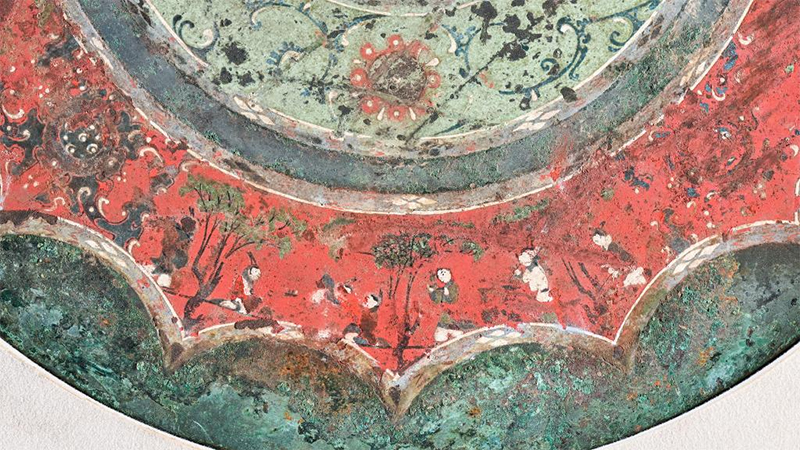Beijing hosts delegation, urges immediate cease-fire in Gaza

Member of the Political Bureau of the CPC Central Committee and Foreign Minister Wang Yi meets a delegation of foreign ministers from Arab and Islamic countries in Beijing on November 20, 2023. Photo: Chinese Foreign Ministry
China urged an immediate cease-fire in the Gaza Strip, expressed opposition to any forced displacement and relocation of Palestinian civilians and emphasized that any arrangement concerning the future and destiny of the Palestinian people must have their consent, Chinese top diplomat Wang Yi told visiting Arab and Islamic foreign ministers on Monday.
Apart from talks with Arab and Islamic countries, China is also keeping communication with other permanent members of the UN Security Council on the Palestinian-Israeli issue.
Chinese President Xi Jinping and French President Emmanuel Macron said Monday that it is imperative to avoid further deterioration of the Palestinian-Israeli situation, especially the emergence of a more serious humanitarian crisis.
The two heads of state, in a telephone conversation on Monday, agreed that the two-state solution is the fundamental way to solve the cycle of Palestinian-Israeli conflicts.
At the invitation of South African President Cyril Ramaphosa, President Xi Jinping will attend the BRICS extraordinary virtual summit on the Palestinian-Israeli issue and deliver important remarks in Beijing on the evening of November 21, Foreign Ministry Spokesperson Hua Chunying announced on Monday night.
China will continue to work with Arab and Islamic countries to promote the full implementation of the relevant resolutions of the United Nations General Assembly and the Security Council on the Israeli-Palestinian conflict, Chinese Vice President Han Zheng said on Monday while meeting the delegation of Arab and Islamic foreign ministers in Beijing.
China highly appreciates the peace efforts and the call for justice at the Joint Arab Islamic Extraordinary Summit and supports the joint ministerial follow-up committee to play a greater role, Han said.
A delegation consisting of Arab and Islamic foreign ministers is visiting China from Monday to Tuesday, including Saudi Foreign Minister Prince Faisal bin Farhan Al Saud, Jordanian Deputy Prime Minister and Foreign Minister Ayman Safadi, Egyptian Foreign Minister Sameh Shoukry, Indonesian Foreign Minister Retno Marsudi, Palestinian Foreign Minister Riyad Al-Maliki and Secretary General of the Organisation of Islamic Cooperation Hissein Brahim Taha.
During the visit, China will have in-depth communication and coordination with the delegation on ways to deescalate the ongoing Palestinian-Israeli conflict, protect civilians and seek a just settlement of the Palestinian question, according to the Chinese Foreign Ministry.
The delegation, which is set to meet officials representing each of the five permanent members of the UN Security Council, is also piling pressure on the West to reject Israel's justification of its actions against Palestinians as self-defense, and Beijing is the first leg of their tour, Reuters reported on Monday.
The UN Security Council must listen to the voices of Arab and Islamic countries and take responsible actions to cool down the situation, Wang said. As the rotating presidency of the Security Council, China will continue to strengthen coordination with Arab and Islamic countries, build consensus and push the Security Council to take further meaningful actions on the situation in Gaza, Wang said.
Taking China as the first stop of its international mediation efforts shows a high degree of trust in China and reflects the fine tradition of mutual understanding and mutual support between the two sides. China is a good friend and a good brother of Arab and Islamic countries, Wang told Arab and Islamic diplomats.
China has always firmly upheld the legitimate rights and interests of Arab and Islamic countries and firmly supported the just cause of the Palestinian people in restoring their legitimate national rights and interests, the Chinese diplomat said.
In regard to this conflict, China has firmly stood on the side of justice and fairness, has been working hard to de-escalate the conflict, protect civilians, expand humanitarian aid, and prevent humanitarian disasters, and has been calling for a return to the two-state solution and the early settlement of the Palestinian question, Wang said.
The visit also came after the UN Security Council adopted its first resolution on Wednesday since the Israeli-Palestinian conflict broke out under China's active rotating presidency role. The council had failed to adopt four draft resolutions on the situation in a row.
China's position on the Palestinian question aligns with that of the Arab and Islamic world and its proposition on the issue is also in line with the status of the issue itself, helping China gain the trust of the Arab and Islamic countries, some experts said. Under China's mediation, Saudi Arabia and Iran have agreed to restore diplomatic relations in March, highlighting the constructive role that China has been playing in the Middle East.
Major push for peace
In the meeting with Arab and Islamic officials, the Chinese Foreign Minister said the pressing task now is to fully implement relevant resolutions of the UN Security Council and the UN General Assembly and achieve an immediate cease-fire and cessation of hostilities. A cease-fire should not be a diplomatic rhetoric. It is a matter of life and death for the people in Gaza.
A cease-fire should be achieved as a top priority. This is the pressing need of the people in Gaza, the wish of the overwhelming majority of countries, and the unanimous voice of all peace-loving people around the world, Wang said.
"A cease-fire and humanitarian pauses are two different things. While Arab and Islamic countries and China are demanding a cease-fire, the US-led West is asking for humanitarian pauses," Niu Xinchun, a research fellow at the China Institute of Contemporary International Relations, told the Global Times on Monday. "There's still a huge gap between humanitarian pauses and a ceasefire."
The latest resolution adopted by the UN Security Council called for "urgent and extended humanitarian pauses and corridors throughout the Gaza Strip", with three abstentions - Russia, the US and the UK. Some experts saw the resolution as being a product of compromise.
Countries like Jordan and Egypt play an important role on the Palestinian question. For example, as one of the surrounding countries to the Gaza Strip, Egypt could play a bigger role in terms of humanitarian aid, Liu Zhongmin, a professor at the Middle East Studies Institute of Shanghai International Studies University, told the Global Times on Monday.
"Also, countries like Saudi Arabia and Egypt could play an important role in the future resolution of the Israeli-Palestinian conflict, in which the discussion between those countries and China could focus on some practical issues," Liu said.
The fundamental reason for the cycle of conflict between Palestine and Israel is that the Palestinian people's right to statehood and survival and their right of return to their homes have been ignored for a long time, Wang said at the meeting.
The way out is to implement the two-state solution and establish an independent Palestinian state. China calls for an early convening of an international peace conference with greater scale, scope and effectiveness, and a timetable and roadmap for this purpose, Wang said.
Divisions exist
In a recent joint Islamic-Arab summit in Riyadh, Saudi Arabia and other Muslim countries called for an immediate end to military operations in Gaza, rejecting Israel's justification of its actions against Palestinians as "self-defense." The development was seen as a historic moment of the Arab-Islamic world moving toward unity while Israel intensifies its attacks on the Gaza Strip.
However, the absence of Turkey and Iran from the delegation showed that divisions still exist among Arab and Islamic countries, especially when Turkey's stance on the Palestinian question appeared to be much stronger than Saudi Arabia's, experts noted. "They did not come up with a consensus on imposing countermeasures on Israel nor measures against the US, showing that Arab-Islamic unity is still in question," Liu said.
An Israeli official said on Monday that progress has been made in the Qatar-mediated talks aimed at freeing some of the 240 hostages held by Hamas militants in the Gaza Strip.
According to Israel's state-owned Kan TV news, the proposed deal includes the release of about 50 women and children, who would be released in several stages. In exchange, Palestinian women and minors currently held in Israeli prisons would be released, in addition to a few-day pause in the relentless Israeli strikes on the Gaza Strip.
Six weeks into the war, Israel is facing intense international pressure to justify its operations, according to the media report.
Israel officials have also warned that a "window of legitimacy" for the war to rout Hamas may be closing, media reported.
"It's hard to say if the conflict will become a long-term war, but at least it won't stop for now," Niu said, noting that as Israel's own goals are far from being met.
Photos
Related Stories
- FM: Cease-fire in Gaza 'key to survival'
- Israel strikes Lebanon's southern city Nabatieh for 1st time since 2006 war
- Hope for long-term Israel-Hamas ceasefire deal remote, as divergences remain large: experts
- UN chief wants return of two-state solution after Gaza crisis
- Israel strikes Lebanon's southern city Nabatieh for 1st time since 2006 war
- Israeli strikes on Gaza school kill at least 100 Palestinians: source
Copyright © 2023 People's Daily Online. All Rights Reserved.









